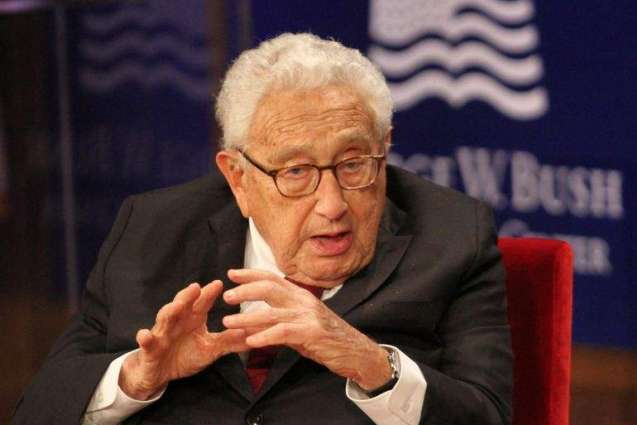Henry Kissinger, a German-born Jewish refugee, played a pivotal role in shaping US foreign policy during the 1970s, particularly during the Cold War.
WASHINGTON: (UrduPoint/Pakistan Point News-Nov 30th, 2023) Henry Kissinger, a prominent figure in diplomacy, renowned for his roles as a national security adviser and secretary of state under two presidents, passed away at the age of 100 on Wednesday.
The news of his death was announced by his geopolitical consulting firm, Kissinger Associates Inc., stating that he died at his home in Connecticut. The circumstances of his death were not disclosed.
According to the firm's statement, a private family service will be held for interment, followed by a public memorial service in New York City at a later date. Despite reaching the age of 100, Kissinger remained active, participating in White House meetings, publishing a book on leadership, and addressing a Senate committee on the nuclear threat posed by North Korea. He made a surprise visit to Beijing in July 2023 to meet with Chinese President Xi Jinping.
Henry Kissinger, a German-born Jewish refugee, played a pivotal role in shaping US foreign policy during the 1970s, particularly during the Cold War. His contributions included facilitating the US diplomatic opening with China, engaging in landmark US-Soviet arms control talks, fostering expanded ties between Israel and its Arab neighbors, and negotiating the Paris Peace Accords with North Vietnam.
While Kissinger received praise for his strategic brilliance, he also faced criticism, with some labeling him a war criminal for supporting anti-communist dictatorships, particularly in Latin America. In later years, his international travels were restricted due to the efforts of other nations seeking to question him about past US foreign policy decisions.
Despite the controversies, Kissinger continued to wield influence, even after Nixon's resignation in 1974. Serving as secretary of state under President Gerald Ford, he maintained a strong presence in diplomatic circles throughout his life. Ford described him as a "super secretary of state" but noted his prickliness and self-assurance.
Born Heinz Alfred Kissinger in Germany in 1923, he became a naturalized US citizen in 1943, served in the Army during World War II, and pursued an academic career at Harvard University. Kissinger's involvement in government consulting, including serving as an intermediary in Vietnam peace negotiations, eventually led him to the White House as national security adviser under President Nixon.
While Kissinger's tenure saw significant diplomatic achievements, such as the easing of US-Soviet tensions through detente, it was not without controversy. His involvement in the Vietnam War and criticisms over his stance in the India-Pakistan War of 1971 contributed to a mixed legacy.
Following his government service, Kissinger established a consulting firm in New York, offering advice to corporate elites. He continued to engage in public discourse, writing books, serving on boards, and providing commentary on international affairs. Despite being initially selected by President George W. Bush to lead an investigative committee after the 9/11 attacks, Kissinger stepped down due to conflicts of interest with his consulting firm's clients, following objections from Democrats.
Henry Kissinger, divorced from his first wife in 1964, married Nancy Maginnes in 1974, with whom he had two children. His passing marks the end of an era in diplomatic history, leaving behind a legacy that encompasses both accolades and controversies.




